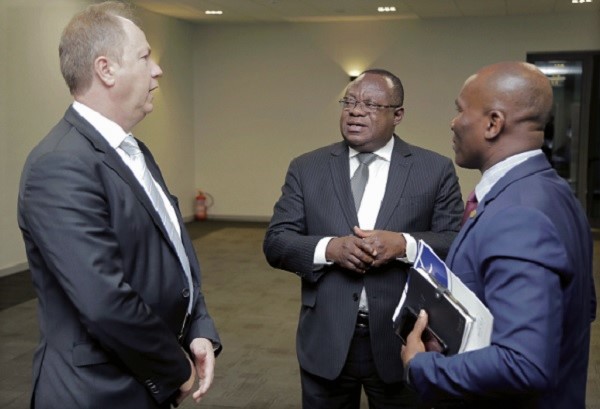In its quest to ramp up oil production in the country, the government is taking steps to amend two petroleum laws to enable it to achieve that objective.
The laws, the Exploration and Production Act, 2016 (Act 919) and the Petroleum Exploration and Production General Regulations, 2018 (L.I. 2359), are to be reviewed to give oil-producing companies the opportunity to develop more wells within their operational fields to increase the country’s production of the commodity.
Subsequently, a bill is scheduled to be laid before Parliament this month to give legal backing to the initiative.
The Executive Vice-President of Tullow Ghana, Mr Kweku Awotwi, dropped the hint when his company took its turn at the Facts Behind the Figures Series on the Ghana Stock Exchange (GSE) in Accra yesterday.
Tullow and other oil companies have had series of engagements with the government to enable them to have the permit to explore new fields within their existing development and producing areas (DPA).
“There is a broad agreement that if we are able to access the other parts of our agreements, it will be positive for us at Tullow and the country.
“We are made to understand that next month, there is going to be a Bill in Parliament to give us access to some of those areas,” he said, while responding to a question on an update on their proposal to the government in that regard.
A passage of the bill will subsequently result in an increase in oil activities and productivity which will translate into more revenues for the government as well as opportunities for jobs.
Amending the law
The Petroleum (Exploration and Production) Act, 2016 Act 919 applies to petroleum activities within the jurisdiction of Ghana, including activities in, under and upon its territorial land, inland waters, territorial sea, exclusive economic zone and its continental shelf.
The act exists to provide for and ensure safe, secure, sustainable and efficient petroleum activities and utilisation for the benefit and welfare of the people of Ghana.
Mr Awotwi explained that the current law did not make provision for oil companies to produce more within their existing DPA.
He reiterated that the opportunities in the near fields were huge and getting access would require an amendment to the existing law, adding that significant progress had been made following engagements with the government in that direction.
“The current law does not encourage that but all we need is to make small amendments to the law and it would allow companies like Tullow to go back in. It is actually an industry request to encourage more production,” he said.
Win-win situation
Mr Awotwi noted that securing more rights within an existing DPA presented a more cost-effective approach to increase production, resulting in a win-win situation for both the producers and the country.
“There should be more production and reserves available. For no additional cost, you can access new reserves. Over a 10 to 15-year period, those small pockets of additional reserves add up and they can be substantial, so Tullow gets more and the country gets more as well,” he said.
Tullow in Ghana
Tullow Ghana together with its partners currently operates the Jubilee Field and the Tweneboa Enyera and Ntomme (TEN) fields, the country’s main oil producing fields.
Eni is the lead operator of the Sankofa Gye Nyame (SGN) Field.
A total of 34.3 million barrels of oil was produced from Ghana’s three offshore producing Fields — Jubilee, TEN and the Sankofa Gye Nyame fields — from January to June 2019.
In the first half of 2019, gross production from the Jubilee field averaged 88,500 barrels of oil per day (bopd) while the TEN fields have produced 61,500 bopd gross in the first half of 2019.
Mr Awotwi explained that although every jurisdiction was different, the standard to encourage exploration was that many countries gave new companies a number of years to explore, after which the area was relinquished.
“What happened was that Tullow had acreage and they gave it up. But after that, we found oil and started to produce and because there is infrastructure to produce that oil now, it is actually cost-effective to go back to those areas,” he added.

Mr Ekow Afedzie (2nd left), acting Managing Director, Ghana Stock Exchange, interacting with Mr Les Wood (left), Chief Financial Officer, Tullow Oil PLC, and a participant after the Facts and Figures forum.
ACEP sounds caution
In a separate interview, the Executive Director of the Africa Centre for Energy Policy (ACEP), Mr Benjamin Boakye, said the proposal by the oil producing companies to secure more rights within their PDA was still being considered, bearing in mind the risks and benefits to the country.
He said the bill before Parliament would provide the platform for further engagement and interrogation of the proposal, and not necessarily an approval of the proposal.
“We need to continue to explore what it means for Ghana because it is a proposal that the companies are making.
“We need to know the risks and benefits and the balance between the two would inform a decision to be taken on it,” he said.
Not unusual
A source familiar with the sector explained that although it was not unusual to renegotiate the terms of an existing agreement for more rights, the terms must be favourable to the country and this was what would be assessed when the bill was laid before Parliament.
The source added that there was room for Parliament to adjust the terms in the proposal made by the companies if the House found it to be unfavourable.
—graphic.com.gh